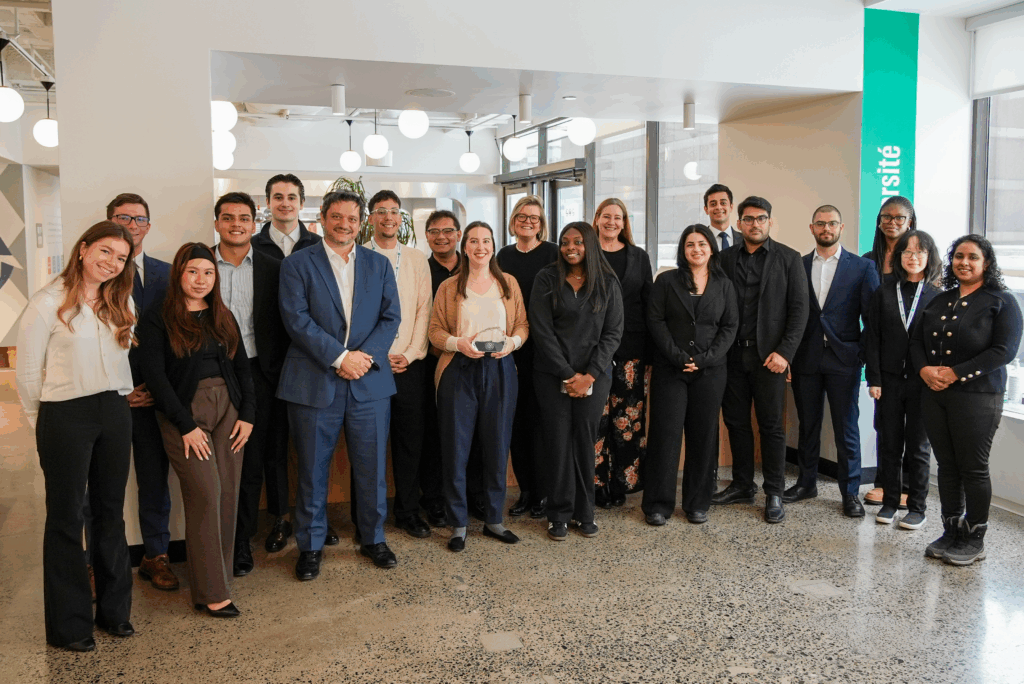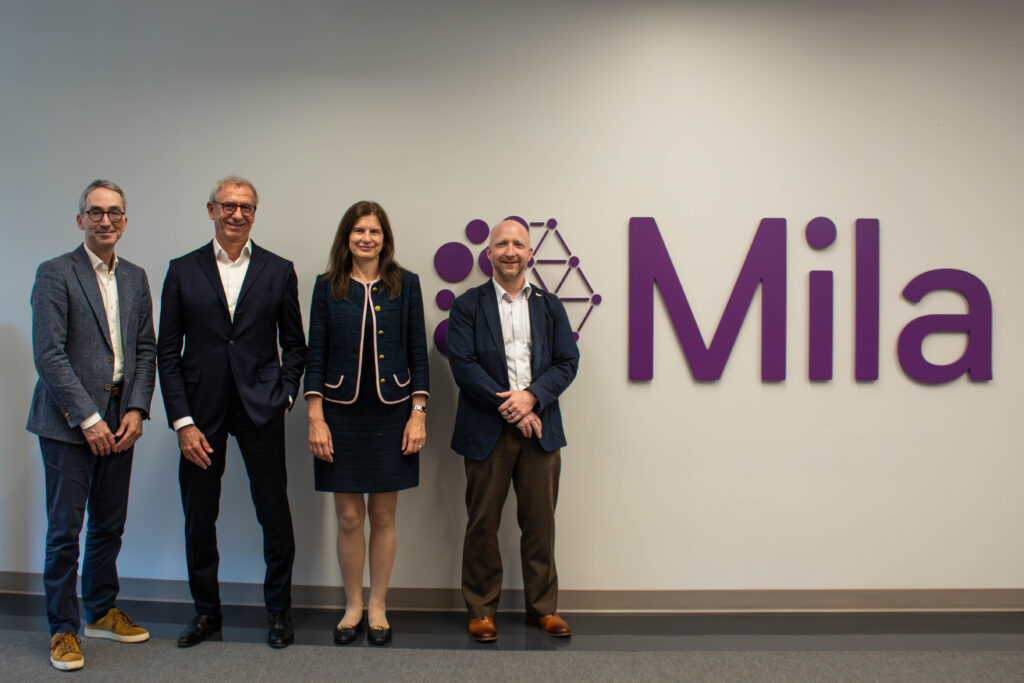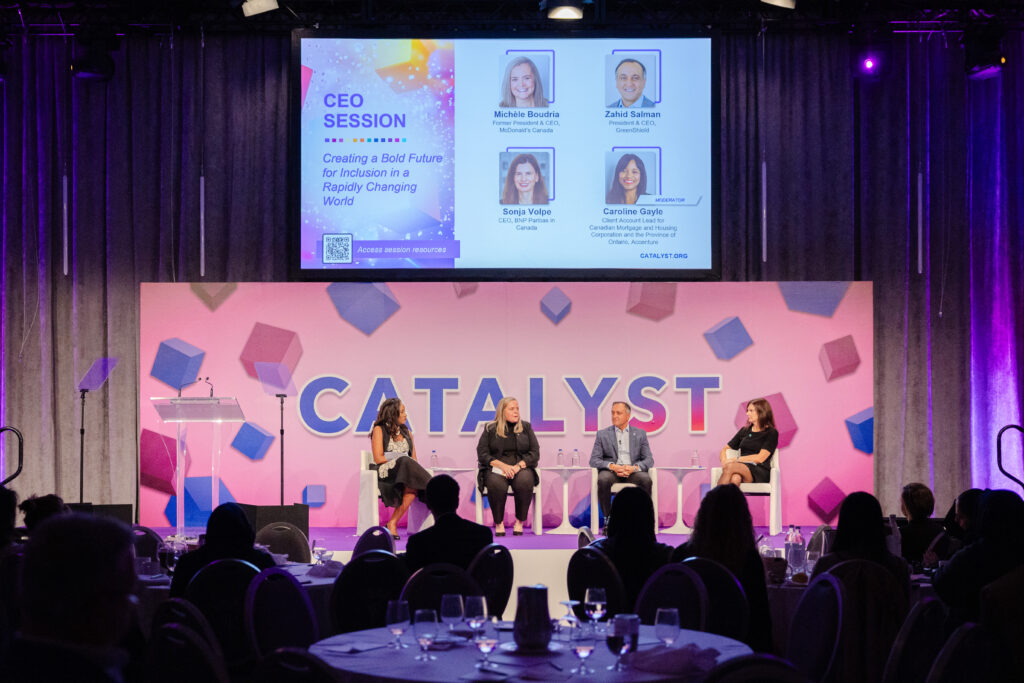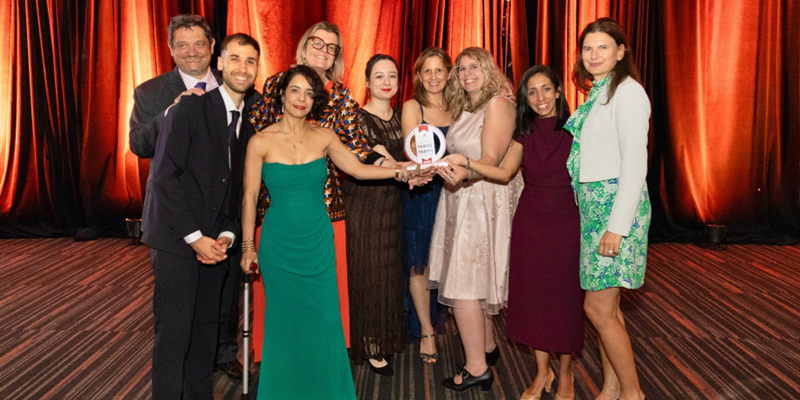BNP Paribas in Canada is proud to share that it has been recognized as one of Canada’s Top Employers for Young People 2026 by Mediacorp. This prestigious award highlights organizations in Canada that excel in creating exceptional workplaces and career opportunities for young professionals.
This recognition reinforces BNP Paribas in Canada’s commitment to fostering a thriving, inclusive, and innovative environment where all employees can develop their skills, grow professionally, and reach their full potential. It also reflects the Bank’s dedication to empowering the next generation of leaders while attracting and retaining top talent in Montreal and Toronto.
Key Initiatives Supporting Young Talent
Several of BNP Paribas in Canada’s key initiatives have played a crucial role in this recognition, especially those focused on career development, mentorship, and networking:
- Mentorship Programs: Connecting entry-level employees with experienced managers to guide career growth and professional development.
- Graduate Development Programs: Personalized programs for recent graduates, focused on skill-building, career goal setting, and professional networking in Montreal and across Canada.
- Annual Group-wide Career Days: Providing employees with opportunities to learn, progress, and connect with colleagues to achieve their career aspirations.

This recognition reflects our ongoing efforts to attract, engage, and retain emerging talent. It demonstrates our commitment to creating a culture where all employees feel heard, valued, and empowered to grow professionally and reach their full potential.
Flavie Motte, Chief Human Resources Officer, BNP Paribas in Canada
Employee Testimonials
Irene de la Fuente Ciordia, Data Analyst, shared: “BNP Paribas in Canada gave me my first professional opportunity as a graduate, and it is truly a great place to start your career. The combination of mentorship, skills training, and networking in an inclusive environment has greatly enhanced my career development.”
Saoudia Ganiou, Campus Recruiter, added: “Starting my career at BNP Paribas in Canada has offered me strong career development and growth opportunities, mentorship opportunities, and a diverse and inclusive work culture. With flexible work policies and competitive benefits, it’s a fantastic place to launch a career.”
About Canada’s Top Employers for Young People
First published in 2002, Canada’s Top Employers for Young People is part of the Canada’s Top 100 Employers competition. Winners are selected based on programs and initiatives that help younger employees succeed, including tuition assistance, co-op or work study programs, mentorship, skills, and training management programs that accelerate professional growth.
Other Recognitions for BNP Paribas in Canada
This award adds to BNP Paribas in Canada’s numerous recognitions for fostering an inclusive and empowering workplace, including:
- One of Montreal’s Top Employers for four consecutive years.
- One of Canada’s Best Diversity Employers for three consecutive years.
- Best Place to Work for Disability Inclusion.
BNP Paribas in Canada continues to invest in young professionals, graduate programs, and mentorship initiatives to maintain its position as a top employer in Montreal and across the country.
Join Us
Looking to launch your career in Montreal or in Toronto? Explore our graduate programs, mentorship opportunities, and flexible work culture at BNP Paribas in Canada.
Montreal, November 19, 2025 – BNP Paribas, a leading European provider of banking and financial services, and Mila, a renowned AI research institute, have entered a partnership to support research and talent development in the field of artificial intelligence in Canada. The collaboration brings together BNP Paribas’ financial expertise with Mila’s established AI research ecosystem with the aim of supporting AI innovation, fostering talent and identifying business opportunities for both organizations in Canada and internationally. This initiative is part of BNP Paribas’ ongoing efforts in AI research, including partnerships and programs.
Frank Roncey, Group Chief Risk Officer, BNP Paribas, said: “Artificial intelligence is reshaping various aspects of the financial services—from risk management to client experience. By joining forces with Mila—a global hub of AI excellence—BNP Paribas aims to strengthen its research capabilities, tap into exceptional talent and co-create solutions that support sustainable growth for our clients.”
Stéphane Létourneau, Executive Vice President, Mila, added: “Mila brings together top researchers, students, and start-ups. Partnering with BNP Paribas allows us to further apply our expertise in the financial sector, providing our community with invaluable real-world challenges and application opportunities while strengthening our capacity to translate cutting-edge AI research into societal impact.”

Core Pillars of the Partnership
The collaboration grants BNP Paribas access to Mila’s ongoing scientific developments, enabling early awareness of emerging technologies and fostering dialogue with leading researchers. It also establishes direct links to Mila’s talent pool comprising over 1,500 students and scholars, through priority access to recruitment events, internship programs, and executive-level AI training designed for senior leaders. These elements support BNP Paribas’ commitment to responsible AI and its integration into the Group’s long-term strategy.
Beyond research and talent, the partnership will also amplify BNP Paribas’ integration within Montreal’s dynamic AI ecosystem, as well as contribute to Mila’s global presence and outreach.
Areas of collaboration
BNP Paribas will participate in Mila’s AI hub, working alongside startups and academic partners to support the development and practical application of AI solutions. Mila will benefit from opportunities to validate research in operational environments.
A few examples:
- Joint research initiatives – Collaborative projects will explore the applications of artificial intelligence in areas that support more resilient economies such as environmental, social and governance (ESG), geofinance, risk assessment and the analysis of potential risk interconnections.
- Talent development – Direct access to Mila’s academic community will support the development of technical and research expertise within both organizations.
- Responsible AI – Both organizations share commitment to ethical and inclusive AI development, contributing to positive societal outcomes.
About BNP Paribas
Leader in banking and financial services in Europe, BNP Paribas operates in 64 countries and has nearly 178,000 employees, including more than 144,000 in Europe. The Group has key positions in its three main fields of activity: Commercial, Personal Banking & Services for the Group’s commercial & personal banking and several specialized businesses including BNP Paribas Personal Finance and Arval; Investment & Protection Services for savings, investment and protection solutions; and Corporate & Institutional Banking, focused on corporate and institutional clients. Based on its strong diversified and integrated model, the Group helps all its clients (individuals, community associations, entrepreneurs, SMEs, corporate and institutional clients) to realize their projects through solutions spanning financing, investment, savings and insurance. In Europe, BNP Paribas has four domestic markets: Belgium, France, Italy and Luxembourg. The Group is rolling out its integrated commercial & personal banking model across several Mediterranean countries, Türkiye, and Eastern Europe. As a key player in international banking, the Group has leading platforms and business lines in Europe, a strong presence in the Americas as well as a solid and fast-growing business in Asia-Pacific. BNP Paribas has implemented a Corporate Social Responsibility approach in all its activities, enabling it to contribute to the construction of a sustainable future, while ensuring the Group’s performance and stability.
About Mila – Quebec Artificial Intelligence Institute
Founded by Professor Yoshua Bengio of the Université de Montréal, Mila is the world’s largest academic research center for deep learning, bringing together over 1,500 specialized researchers in machine learning. Based in Montreal and funded in part by the Government of Canada through the Pan-Canadian AI Strategy, Mila’s mission is to be a global center for scientific advancements that inspire innovation and the growth of AI for the benefit of all. Mila is a globally recognized non-profit organization for its significant contributions to deep learning, especially in the fields of language modeling, automatic translation, object recognition, and generative models. For more information, visit mila.quebec.
Media Contacts
BNP Paribas
Jelena Nedelka
jelena.nedelka@us.bnpparibas.com
+1 332 280 1394
Guillaume Semene
guillaume.semene@ca.bnpparibas.com
+1 438 227 7540
Mila
Christian Ahuet
christian.ahuet@mila.quebec
This press release is issued jointly by BNP Paribas and MILA. For additional information, please visit www.bnpparibas.com and www.mila.quebec.
The 2025 Catalyst Honours Conference brought together over 650 of Canada’s most influential business leaders and inclusion champions to discuss powerful solutions for today’s most pressing workplace challenges and define the future of inclusion. As a sponsor of this year’s conference, BNP Paribas in Canada was proud to provide tickets to community leaders and underrepresented groups to foster meaningful participation and ensure that these marginalized voices had a seat at the table.
With this year’s theme, “Inclusion by design: Breaking barriers, building belonging,” leaders were urged to embed inclusion into the very foundation of work— bridging the gap between strategy and implementation, and transforming policies into tangible outcomes. Sonja Volpe, CEO of BNP Paribas in Canada and recipient of the 2025 Catalyst Honours Champion for her transformative work accelerating workplace inclusion, shared powerful insights on how organizations can embed inclusion into their DNA, ensuring it becomes a pillar of long-term resilience and growth.
From Hiring to Belonging: Building an Inclusive Culture
The days of treating DEI solely as a recruitment exercise are over. Today, inclusion is a growth engine—directly tied to innovation, talent retention, and financial performance.
“When employees feel valued and free to be themselves, they perform better. And when people perform better, the organization performs better.”
Sonja Volpe, CEO, BNP Paribas in Canada
At BNP Paribas in Canada, this means:
- Dedicated DEI recruiters and a neurodiversity hiring program to expand access to diverse talent and build a representational workforce that reflects the diversity of the communities we operate in.
- Inclusive leadership training for all Canada managers, as well as trainings for all employees on tackling unconscious bias.
- DEI objectives for all managers to ensure accountability at every level.
- Over 60 DEI events annually, led by our very active network of Employee Resource Groups (ERGs).
- Multiple mentorship and leadership programs for women to create pathways for women’s inclusivity in senior leadership and ensure that inclusion outlasts individual tenures.
Ultimately, inclusion is not a one-time initiative— it is a continuous, collective effort to dismantle barriers and cultivate a culture that embraces all differences so that each employee can be their authentic selves.

Inclusion as a Leadership Priority
For inclusion to truly take root, organizations must view DEI as every leader’s responsibility, rather than solely part of HR’s mandate.
At BNP Paribas in Canada, the DEI team reports directly to the CEO, while regular reviews with the heads of business lines track diversity metrics, benchmarks, challenges, and more— not only keeping DEI top of mind, but ensuring that inclusion is integrated into the strategic and operational planning of the Bank and regular monitoring, rather than treated as an afterthought.
The key insight? The most successful organizations embed inclusion into all aspects of their activities, from leadership and governance to services, operations, employee engagement and even benefits.
Intersectionality: Recognizing That One Size Doesn’t Fit All
Importantly, true inclusion requires an intersectional approach— acknowledging that employees bring multiple identities that can intersect and shape their unique experiences.
Organizations must foster cultures that are inclusive to employees across all their intersecting identities, and recognize that a one-size-fits-all approach to inclusion often overlooks the distinct challenges that employees from underrepresented backgrounds can face.
At BNP Paribas in Canada, we have placed a strong emphasis on intersectionality throughout all our inclusion initiatives including:
- Panels on women’s intersecting identities in the workplace.
- Trainings on visible and invisible disabilities.
- Roundtables on the diverse experiences of the Black diaspora and the Asian diaspora.
- Workshops on becoming aware of privilege, intersectionality, and more through our Pride Employee Resource Group.
The Bold Future for Inclusion: Continuous Evolution, Not a Destination
Sonja Volpe stressed that organizations must treat inclusion as a living, evolving practice—not as static achievement or trend.
At BNP Paribas in Canada, this means setting up pathways for women’s inclusivity in senior leadership through our multiple mentorship and female leadership programs. It also involves regular monitoring and benchmarking to keep inclusion efforts dynamic and responsive, as well as ensure that we constantly develop and improve our processes so that every employee is supported and empowered to thrive.
Ultimately, the 2025 Catalyst Honours Conference reaffirmed BNP Paribas in Canada’s longstanding belief that inclusion and belonging are key for our continued success. As the bank for a changing world, it is part of the way we are attracting and retaining top talent, driving innovation, and strengthening resilience for the future.
BNP Paribas in Canada is proud to share that it has once again been awarded the Platinum-level Parity Certification from Women in Governance (WiG)— the highest level of recognition for gender parity in the workplace. This recognition reaffirms BNP Paribas in Canada’s ongoing commitment to building a more inclusive organization where all employees can thrive, and reflects the Bank’s longstanding dedication to achieving gender equity at every level.
First launched in 2017, the Women in Governance Parity Certification is the first of its kind in North America, and recognizes organizations that adopt measures, practices, and programs that promote gender balance and bridge equity gaps in their workplaces. BNP Paribas is one of only a handful of organizations to be certified platinum for 2024— being recognized as a leader in creating a workplace that is inclusive to women in all their intersecting identities.

Photo credit: Gaëlle Vuillaume
BNP Paribas in Canada’s key initiatives including promoting parity at the decision-making level of the Bank, multiple leadership and mentorship programs to create a pipeline of female talent, and our emphasis on intersectionality have all played a pivotal role in achieving this prestigious certification for the second year in row. After progressing from silver, to gold, to platinum-level parity, this recognition is a testament to our ongoing journey in advancing gender inclusion, and reaffirms our deep-rooted belief that inclusiveness and belonging are key for our continued success.
Gender parity is not a destination but an ongoing journey. This Platinum Certification is more than just an honour— it is a powerful reflection of our continuous, collective efforts to create a work environment where every individual, regardless of gender and across all intersecting identities, is supported and empowered to thrive. It is also a reminder that we must continuously work together to dismantle barriers and cultivate a culture that embraces all differences so that each employee can be their authentic selves.
Laetitia Fouquet Pimpin, Head of Diversity, Equity, and Inclusion for BNP Paribas in Canada
In addition to the Platinum Certification, BNP Paribas in Canada is recognized as a Best Place to Work for Disability Inclusion, one of Canada’s Best Diversity Employers for three years in a row, and one of Montreal’s Top Employers for four years in a row.
We are pleased to announce that BNP Paribas in Canada has earned a top score on the 2025 Disability Index® and has been recognized as a Best Place to Work for Disability Inclusion.
This recognition is a testament to our ongoing commitment and work in advancing disability inclusion and creating a workplace where all employees— regardless of their visible or invisible abilities— can feel heard, valued, safe and supported, and can be their authentic selves. This top score reaffirms our longstanding belief that inclusiveness and belonging are key for our continued success.
The Disability Index is the world’s leading third-party benchmarking tool for evaluating corporate disability inclusion and is used by hundreds of companies globally, including over 70% of the Fortune 100 and nearly half of the Fortune 500.
The Disability Index measures performance across six key areas, including Culture & Leadership, Enterprise-Wide Access, Employment Practices, Community Engagement, Supplier Inclusion, and Responsible Procurement.
“Building a truly inclusive workplace means fostering a culture where all employees— across all their intersecting identities— can thrive, including those with disabilities,” said Laetitia Fouquet Pimpin, Head of Diversity, Equity, and Inclusion for BNP Paribas in Canada. “This top score is the result of continuous efforts and not a destination. It is a reminder that we must continuously work to dismantle barriers, strengthen education and awareness, and cultivate a culture that embraces all differences. And we’re committed to doing it together.”
BNP Paribas in Canada understands that there is always room to advance disability accessibility, and this top score indicates adherence to many leading disability inclusion practices that the Bank is committed to developing and enhancing for all— continuously striving to build a workplace where everyone belongs.
This top score is in addition to the numerous other notable recognitions that the Bank has received this year including one of Montreal’s Top Employers for the fourth consecutive year, one of Canada’s Best Diversity Employers for the third consecutive year, as well as the prestigious platinum-level parity certification by Women in Governance— the highest level awarded to organizations— for the second consecutive year.
Article en anglais uniquement
Co-authored: Sonja Volpe, CEO – BNP Paribas in Canada, and recently appointed Senator Paulette Senior
When we imagine a leader, many of us still conjure up an image of a singular all-knowing decision-maker, maintaining a stereotype that has been deeply ingrained in our society. But it’s time for a shift, one that welcomes and promotes inclusive leadership as the way forward. Read more

Innovative financing solutions are facilitating the shift to a net-zero economy in the Great White North.
The 2021 UN Climate Change Conference, COP26, highlighted the role of the private sector in driving urgent action to reverse the impact of global warming. In Canada, corporates are sharpening their focus on environmental, social, and governance (ESG) factors as part of the country’s broader transition to a low-carbon economy.
“The shift to a sustainable future is dependent on corporates committing to clear and ambitious targets to fight against climate change,” said Sonja Volpe, President and CEO, BNP Paribas Canada. To accelerate these sustainability ambitions, corporates are increasingly exploring financial solutions such as Sustainability-Linked Bonds (SLBs) and Sustainability-Linked Loans (SLLs) that use key performance indicators (KPIs) to measure a firm’s progress towards achieving ESG targets.
In Canada, this approach is reflected in two sectors where the country has traditionally been a global leader: energy, and metals and mining.
Renewable powerhouses
Over the past several decades, the Canadian energy sector has seen a gradual transition away from thermal-based, domestic independent power producers to global developers, owners and operators of renewable assets.
Toronto-based Brookfield Renewable, operators of one of the largest publicly traded renewable power platforms globally, expanded its portfolio in 2021 with the acquisition of the 845MW Shepherds Flat Wind Farm in Oregon. As one of the largest onshore wind farms in the world, Brookfield plans to boost total generation at Shepherds Flat by approximately 25 percent through a repowering using improved turbine technology. With a power purchase agreement in place with a US West Coast utility, the wind farm plays a role in the drive to achieve net-zero.
BNP Paribas supported the financing of Brookfield’s repowering project at Shepherds Flat, as well as the firm’s €512m dual-tranche refinancing of two European brownfield concentrated solar power plants — Extresol 3 and Serrezuela Solar II, located on the Iberian peninsula— with storage and total capacity of 100 MW.
Together these financing arrangements support Brookfield as it continues expanding its renewable power portfolio – which includes hydroelectric, wind, solar and storage facilities across North America, South America, Europe and Asia – and further consolidates its leading role in the decarbonisation of global power generation. Brookfield Renewable also renewed and extended its US$1.975bn of corporate revolving credit facilities, converting it fully to a sustainability-linked facility. BNP Paribas was the first bank to implement such a structure with Brookfield Renewable over two years ago, serving as sustainability structuring agent.
Power players
Other participants have also stepped up the pace. Toronto-based Northland Power Inc. (NPI) is one such firm, focusing on the development, construction and operation of offshore wind farms, as well as onshore wind and solar renewable assets across North America, Asia, Europe and Latin America.
Most recently, NPI renewed and extended its CAD $1bn revolving credit facility (RCF) to an SLL structure that aligns with its new ESG framework, unveiled in the first half of 2021. The five-year RCF features a pair of KPIs with targets linked to increasing NPI’s renewable energy generation and reducing carbon emissions. BNP Paribas acted as a co-sustainability coordinator on the SLL.
The ESG framework also includes strong social commitments, such as enhancing personal welfare standards on behalf of its employees, contractors and other stakeholders by developing programs and initiatives aimed at forging a more inclusive workplace environment.
Mining for progress
Metal and mining firms are also playing an important role in the transition towards renewable energy production. The sector’s impact ranges from the electrification of mining apparatus to providing critical components for electrified vehicles and other alternatives.
Vancouver-based Teck Resources Limited, a leading diversified-resources company with interests including steelmaking, coal, copper, zinc and energy, has set a long-term target to be carbon neutral across all operations and activities by 2050. To help accelerate its progress, Teck recently secured a USD $4bn, five-year sustainability-linked RCF, the first transaction of its kind for the Canadian mining sector and only the second across North America. The SLL incorporates sustainability-based pricing adjustments centered around three main KPIs: a reduction in greenhouse gas intensity, increased workplace diversity and improved health and safety standards by 2025. BNP Paribas acted as co-sustainability structuring agent on the SLL.
A unique opportunity
By using innovative financing solutions such as SLBs and SLLs, Canadian corporates have a unique opportunity to be at the forefront of driving a lower-carbon economy and fostering a more diverse and inclusive society.
As underlined by BNP Paribas’ Volpe: “the financial sector needs to recognise both the urgency and the opportunity associated with achieving a net-zero economy by 2050. If we don’t support companies on their transition journeys, it will be impossible to reach our shared objectives.”